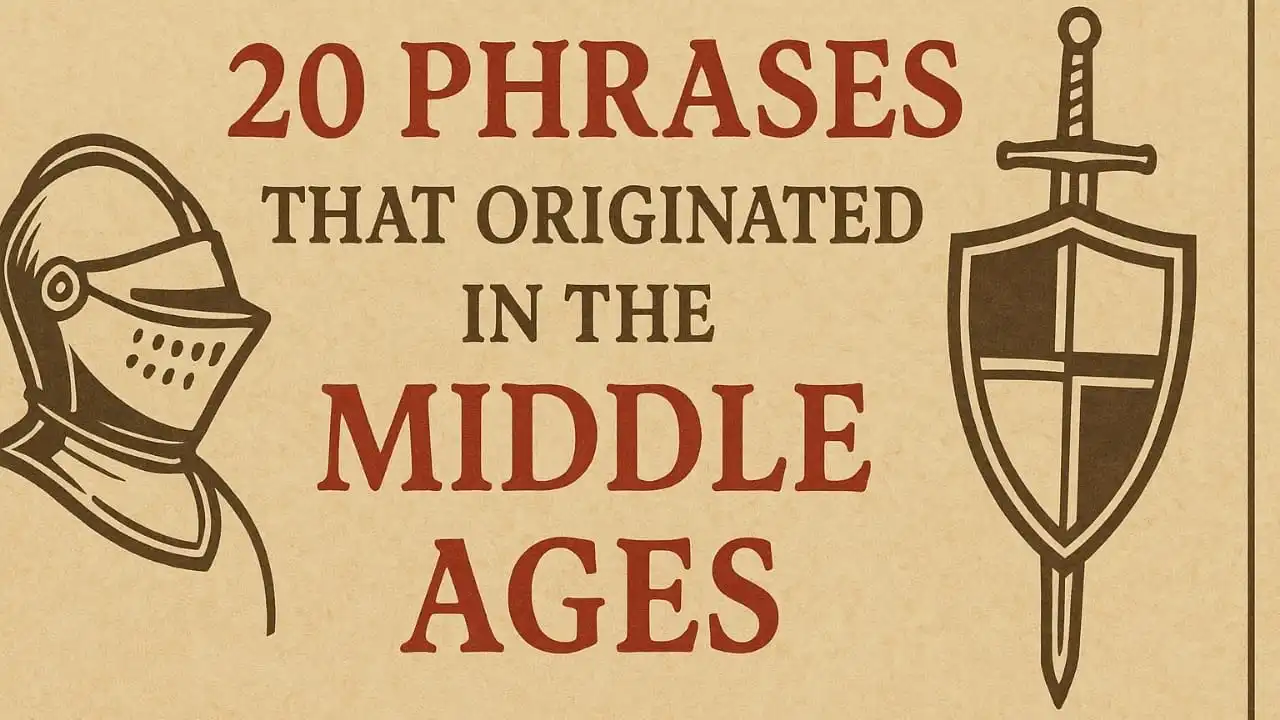Language is a living bridge to history. Every word or phrase we use carries with it centuries of cultural development, storytelling, and tradition. Many common expressions that we casually use today can be traced back to the medieval world, shaped by knights, poets, peasants, and theologians. The Middle Ages, often remembered for castles, cathedrals, and crusades, also gifted us with phrases that still flow naturally in modern speech.
From Chaucer’s witty lines to English legal traditions and from French allegories to Irish chronicles, these idioms reveal a world where language was both symbolic and practical. In this article, we explore twenty phrases that first appeared during the Middle Ages, their original meanings, and how they have survived the test of time.
1. The Apple of One’s Eye
In medieval England, the pupil of the eye was described as an “apple” because it appeared as a small round object. Since vision was considered precious, the phrase came to symbolize something or someone deeply cherished. Even King Alfred the Great used this expression to convey affection. Today, it remains a heartfelt way of describing someone beloved.
2. Baker’s Dozen
The baker’s dozen, meaning thirteen instead of twelve, originated from the Assize of Bread and Ale of 1262. Bakers were often accused of selling underweight bread, so strict laws regulated weights and measures. To avoid punishment, bakers gave an extra loaf when selling a dozen, ensuring they weren’t shortchanging customers. The custom became a phrase that still represents generosity or caution.
3. To Curry Favour
The phrase began as curry favel, from Old French estriller fauvel, which meant grooming a chestnut horse named Fauvel. In the 14th-century French allegory Le Roman de Fauvel, the horse symbolized hypocrisy and deceit, and characters “currying” him sought personal advantage. Over time, favel shifted to favour, giving us the modern meaning of flattering someone to gain benefits.
4. To Play Devil’s Advocate
The Catholic Church formalized the role of advocatus diaboli—the Devil’s Advocate—during canonization processes. The individual’s task was to argue against sainthood, raising all possible objections. Established in the early 16th century, this official position ensured rigorous testing of candidates. Today, the term describes anyone who deliberately takes an opposing viewpoint to test the strength of an argument.
5. To Throw Down the Gauntlet
Knights in shining armor used gauntlets—armored gloves—to protect their hands in battle. A knight who wanted to challenge another to a duel would throw down his gauntlet at his opponent’s feet. Picking it up signaled acceptance of the challenge. The phrase still carries that same sense of issuing a bold and public dare.
6. By Hook or by Crook
Dating back to the 14th century, this phrase is believed to have roots in medieval forestry law. Peasants could legally gather firewood from the king’s forests only if they used a hook (a bill-hook tool) or a shepherd’s crook to cut branches. Over time, it evolved to mean achieving something by any means necessary—lawful or otherwise.
7. Hue and Cry
In 12th-century England, communities shared responsibility for law enforcement. If a crime occurred, bystanders were required to raise a loud “hue and cry”—literally shouting for help—so others could chase the wrongdoer. The phrase emphasizes communal justice, and in modern usage, it still refers to loud public protest or alarm.
8. A Nest Egg
Peasants often left one egg in the hen’s nest to encourage further laying, believing it stimulated productivity. By the 14th century, this practice became symbolic of saving for the future. By the 17th century, the phrase was widely used to describe financial savings or investments intended for later use.
9. A Red-Letter Day
Medieval calendars marked important feast days, saints’ days, and holidays in red ink, while ordinary days were written in black. These “red-letter days” stood out as special occasions of religious or communal importance. Today, the expression refers to any memorable or celebratory day.
10. To Sink or Swim
This grim phrase originated in the medieval ordeal by water, a method of trial to determine guilt or innocence. Accused individuals were thrown into water: sinking implied innocence (since the water “accepted” them), while floating indicated guilt. The cruelty of the test aside, the phrase endures as a metaphor for survival in challenging circumstances.
11. No Man’s Land
Long before the trenches of World War I, No Man’s Land appeared in the Domesday Book of 1086. It described unclaimed or disputed territory, often used for executions near London. By the 14th century, the term became common in describing land belonging to no one. Today, it is a powerful metaphor for abandoned, contested, or dangerous spaces.
12. All That Glitters Is Not Gold
This phrase reminds us that appearances can deceive. French theologian Alain de Lille first penned the idea in the 12th century: “Do not hold everything gold that shines like gold.” Chaucer later echoed the warning in The House of Fame. Centuries later, Shakespeare immortalized it in The Merchant of Venice.
13. Stark Raving Mad
The intensifier “stark,” from Old English meaning “stiff” or “strong,” was often used in medieval descriptions. By the 14th century, “stark mad” described someone entirely insane. The term “raving,” derived from Latin rabidus, was later added for emphasis, giving us the phrase “stark raving mad” to describe complete madness.
14. More Irish Than the Irish Themselves
Norman settlers in Ireland, arriving during the 12th century, gradually adopted local traditions so thoroughly that English rulers grew concerned. The Statutes of Kilkenny (1366) even attempted to curb this assimilation. The phrase “more Irish than the Irish themselves” captures the irony of outsiders embracing native culture more zealously than the locals.
15. Blood Is Thicker Than Water
This phrase is often understood to mean family bonds outweigh friendships. Early references in 13th-century German texts suggest that “blood ties” could not be spoiled by “water,” possibly symbolizing baptism. Over time, it solidified into the common proverb emphasizing loyalty to kin.
16. Let Sleeping Dogs Lie
This cautionary phrase advised against disturbing situations best left alone. Chaucer used a version in Troilus and Criseyde: “It is nought good a sleping hound to wake.” The warning existed in French, too, proving it was a widespread medieval wisdom. Today, it still counsels avoiding unnecessary trouble.
17. Bed of Roses
Le Roman de la Rose, one of medieval Europe’s most influential poems, described gardens of roses symbolizing love and pleasure. From its imagery came the metaphor “bed of roses,” which later came to mean a life of ease or luxury. The association with romance and beauty still makes it a poetic phrase today.
18. Tom, Dick and Harry
In medieval Europe, legal and rhetorical traditions used generic names to stand in for “any man.” The Latin form Titius, Gaius, and Sempronius transformed into various languages: Italian “Tizio, Caio e Sempronio” and French “Pierre, Paul ou Jacques.” English eventually coined “Tom, Dick, and Harry,” representing ordinary people everywhere.
19. One Bad Apple Spoils the Whole Barrel
This proverb is rooted in the literal reality that one rotting apple spreads decay to others stored nearby. Chaucer hinted at this moral lesson in The Cook’s Tale, comparing corrupt companions to rotten fruit. The phrase continues to warn that a single negative influence can harm the whole group.
20. In My Mind’s Eye
First appearing in the writings of Joachim of Flora in the 12th century, the phrase described inner vision or imagination. Chaucer later used it in The Man of Law’s Tale. Centuries on, Shakespeare used it in Hamlet, cementing its place in English. Today, it still means seeing with one’s imagination rather than physical sight.
Comparative Table of Phrases
| Phrase | First Known Use | Origin Context | Modern Meaning |
|---|---|---|---|
| The apple of one’s eye | 9th century | Old English, King Alfred | Someone cherished |
| Baker’s dozen | 13th century | English law on bread weights | Thirteen items |
| To curry favour | 14th century | French allegory Le Roman de Fauvel | Flatter to gain advantage |
| To play devil’s advocate | 16th century | Catholic canonization process | Argue against an idea deliberately |
| To throw down the gauntlet | Medieval chivalry | Knights’ dueling custom | Issue a challenge |
| By hook or by crook | 14th century | Forestry law, peasant rights | By any means possible |
| Hue and cry | 12th century | English law enforcement duty | Loud protest or alarm |
| A nest egg | 14th century | Farming practice with hens | Savings for the future |
| A red-letter day | 15th century | Ecclesiastical calendars | Memorable day |
| To sink or swim | Medieval ordeal | Trial by water | Survive or fail on one’s own |
| No Man’s Land | 11th century | Domesday Book | Disputed or abandoned land |
| All that glitters is not gold | 12th century | French/Chaucer | Appearances deceive |
| Stark raving mad | 14th century | Old English, Latin influence | Completely insane |
| More Irish than the Irish | 14th century | Norman assimilation in Ireland | Outsiders adopting local culture |
| Blood is thicker than water | 13th century | German proverb | Family bonds are strongest |
| Let sleeping dogs lie | 14th century | Chaucer, French proverb | Avoid stirring trouble |
| Bed of roses | 13th century | Le Roman de la Rose | Life of ease or pleasure |
| Tom, Dick and Harry | Medieval Europe | Generic names in law/rhetoric | Ordinary people |
| One bad apple | 14th century | Chaucer’s Cook’s Tale | One corrupting influence |
| In my mind’s eye | 12th century | Joachim of Flora, Chaucer | Imagination or vision |
Why These Phrases Still Matter
The Middle Ages might feel distant, but its culture continues to shape modern speech. These idioms remind us that language evolves yet preserves echoes of the past. They reflect medieval concerns—law, religion, survival, and morality—while proving versatile enough to remain relevant today.
The endurance of these expressions also highlights how storytelling and daily practices create timeless language. Whether it’s a baker ensuring honesty, a knight issuing a challenge, or a poet reflecting on imagination, their words still live with us.
Conclusion
From the battlefield to the bakery, the courtroom to the countryside, the Middle Ages left a permanent imprint on the way we talk. These twenty phrases are more than just relics of the past—they are active threads of history woven into our daily conversations. Next time you hear someone speak of a “red-letter day” or being “stark raving mad,” you’ll know you’re not just hearing English—you’re hearing echoes of the medieval world.








Leave a Reply